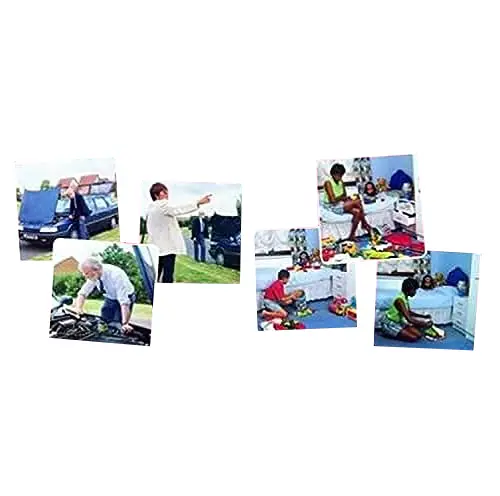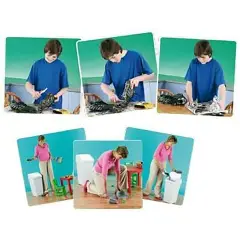Problem Solving
- ✅ Favorisce il pensiero critico attraverso immagini sequenziali di problemi e soluzioni.
- ✅ Aiuta i bambini a sviluppare abilità di risoluzione dei problemi realistici legati alla vita quotidiana.
- ✅ Promuove la comunicazione e l'empatia grazie a discussioni di gruppo guidate da un educatore.
- ✅ Incoraggia la riflessione personale collegando situazioni del gioco a esperienze reali dei bambini.
- ✅ Sostiene la crescita in autonomia decisionale e intelligenza sociale fin dalla prima infanzia.
Descrizione completa
The "Problem Solving" game is an effective educational tool based on the use of sequential pictures to help children develop critical thinking and problem-solving skills. This game is particularly useful because it addresses common problems that children might encounter in their daily lives by providing a relevant and understandable context.
How it works:
1. Problem Scenario: Each sequence begins with a picture depicting a common problem or everyday difficulty. This serves as a stimulus for discussion and reflection, allowing children to identify the problem and consider its impact.
Alternative Solutions: The next two pictures present alternative solutions to the problem. This format encourages children to think critically and creatively, considering multiple options rather than just one "right" or "wrong" answer.
Discussion and Evaluation: Guided by an educator, children discuss potential solutions, exploring the merits and possible consequences of each option. This exercise promotes important skills such as critical analysis, reasoning, and the ability to make informed decisions.
Practical Application: Children could be encouraged to reflect on times when they encountered similar problems and how they reacted. This can help them connect the activity to real experiences, further reinforcing learning.
Educational Benefits:
Critical Thinking: Evaluating alternative solutions promotes critical thinking, encouraging children to weigh different options and consider possible outcomes.
Problem Solving: The structure of the game mimics the process of problem solving in real life, helping children develop practical strategies they can apply to their own experiences.
Communication Skills: The group discussions that arise from these activities help improve communication skills, such as listening, argumentation, and expression of personal ideas.
Empathy and Social Intelligence: By exploring problems that might affect themselves or others, children develop empathy and social intelligence.
Decision-making Autonomy: Making decisions based on evaluating different options helps build confidence in one's ability to make decisions.
Ultimately, "Problem Solving" is more than just a game: it is a life exercise that equips children with essential skills they will use as they grow up. This game, if implemented well, can be a significant step toward developing thoughtful, empathetic and capable adults.
Ti consigliamo anche


























